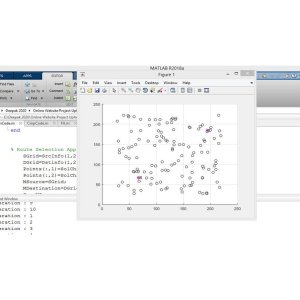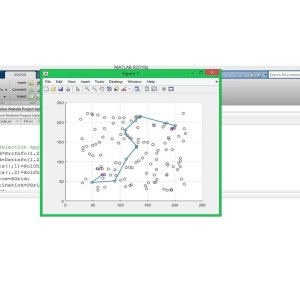Optimizing Wireless Network Routing with Moth Flame Optimization: Enhancing Efficiency and Functionality
Problem Definition
The domain of wireless communication presents a unique challenge in the form of designing an efficient routing protocol. The current method, known as the ETRT method, bases route selection on parameters such as residual energy, expected throughput, and transmission delay. However, it has been identified that this approach may not be optimized for peak performance due to the limited number of parameters considered. Moreover, the static weightage assigned to these parameters (alpha, beta, and gamma) has been found to be inefficient, indicating room for enhancements in the protocol design. As such, there is a pressing need to address these limitations and pain points in the existing routing protocol to improve the overall efficiency and effectiveness of wireless communication systems.
Objective
The objective of this research project is to improve the efficiency and effectiveness of the existing ETRT routing protocol in wireless communication by introducing an optimization algorithm. By extending the parameters used for route selection, replacing static weightage factors with dynamic ones calculated using the Moth Flame Optimization algorithm, and considering the connection between nodes and residual energy in the routing process, the project aims to address the limitations of the current protocol. The project seeks to demonstrate the benefits of the new approach by measuring various factors such as time consumption, delay, energy consumption, throughput, number of dead nodes, end-to-end delay, and average consumption. By utilizing MATLAB as the software platform, the project showcases the practical implementation of the proposed algorithm and its impact on the routing protocol's performance. Through the inclusion of new parameters and advanced optimization techniques, the project aims to contribute to the evolution of routing protocols in wireless communication systems for various application areas like industrial sectors, smart agriculture, smart buildings, and the IoT internet of things.
Proposed Work
The research project aims to address the limitations of the existing ETRT routing protocol in wireless communication by introducing an optimization algorithm. By extending the parameters used for route selection and replacing static weightage factors with dynamic ones calculated using the Moth Flame Optimization algorithm, the project seeks to improve the efficiency and effectiveness of the routing protocol. The proposed method includes the introduction of a fourth parameter and the consideration of the connection between nodes and residual energy in the routing process. By measuring various factors such as time consumption, delay, energy consumption, throughput, number of dead nodes, end-to-end delay, and average consumption, the project aims to demonstrate the benefits of the new approach.
By using MATLAB as the software platform, the project showcases the practical implementation of the proposed algorithm and its impact on the performance of the routing protocol.
The rationale behind choosing the Moth Flame Optimization algorithm lies in its ability to dynamically calculate weightage factors based on the specific requirements of the routing protocol, thereby offering a more adaptive and efficient routing process. The inclusion of new parameters and the use of advanced optimization techniques aim to pave the way for further enhancements and modifications in the field of wireless communication, particularly in application areas such as industrial sectors, smart agriculture, smart buildings, and the IoT internet of things. Through this comprehensive approach, the project aims to contribute to the ongoing evolution of routing protocols for improved wireless communication systems.
Application Area for Industry
This project's proposed solutions can be applied in various industrial sectors such as telecommunications, IoT, smart grid, and industrial automation. In the telecommunications sector, the optimization algorithm for routing protocol can improve the efficiency of data transmission and reduce communication delays. In IoT applications, the proposed method can enhance network reliability and scalability by selecting optimal routes based on multiple parameters. In the smart grid industry, the algorithm can help in establishing secure and reliable communication networks for monitoring and control systems. For industrial automation, the optimized routing protocol can ensure seamless and efficient data exchange between machines and devices, leading to improved productivity and operational efficiency.
By addressing the challenges in wireless communication routing, this project offers benefits such as enhanced performance, reduced energy consumption, and improved network reliability across different industrial domains.
Application Area for Academics
The proposed project has the potential to enrich academic research, education, and training in the field of wireless communication. By introducing an optimization algorithm for routing protocols and utilizing the Moth Flame Optimization algorithm, researchers, MTech students, and PhD scholars can explore innovative research methods and data analysis techniques. The use of MATLAB software and advanced algorithms allows for a deeper understanding of route selection in wireless communication networks, leading to improved efficiency and functionality. The project's findings can be utilized by researchers in the field to enhance their work, develop new methodologies, and further advance the domain of wireless communication technology. The code and literature generated from this project can serve as a valuable resource for academics and students looking to deepen their understanding of routing protocols and optimization techniques in wireless communication.
The project has the potential to open up new avenues for research, education, and training in the field of wireless communication and pave the way for future advancements in the domain.
Algorithms Used
The Moth Flame Optimization Algorithm was used in the research to determine the weightage for each parameter in the proposed route selection model for wireless communication. This algorithm plays a crucial role in enhancing efficiency by assigning proper weightage to the parameters based on the specific requirements. The proposed method involved the introduction of a fourth parameter and the calculation of weightage using the Moth Flame Optimization algorithm with W1, W2, W3, and W4 replacing the static alpha, beta, and gamma factors. The project evaluated various factors like time consumption, delay, energy consumption, throughput, number of dead nodes, end-to-end delay, and average consumption after implementing the proposed method. Further modifications and enhancements were also suggested for future work.
Keywords
wireless communication, routing protocol, optimization algorithm, Moth Flame Optimization, residual energy, expected throughput, transmission delay, MATLAB, IoT, smart agriculture, smart buildings, biomedical domains, route selection, parameter weightage, energy consumption, time consumption, end-to-end delay
SEO Tags
wireless communication, routing protocol, optimization algorithm, ETRT method, route selection, residual energy, expected throughput, transmission delay, Moth Flame Optimization, parameter weightage, MATLAB, IoT, smart agriculture, smart buildings, biomedical domains, research scholar, PHD student, MTech student, efficient routing protocol, connection among nodes, energy consumption, end-to-end delay, average consumption, modifications, enhancements.
| Shipping Cost |
|
No reviews found!



















































No comments found for this product. Be the first to comment!